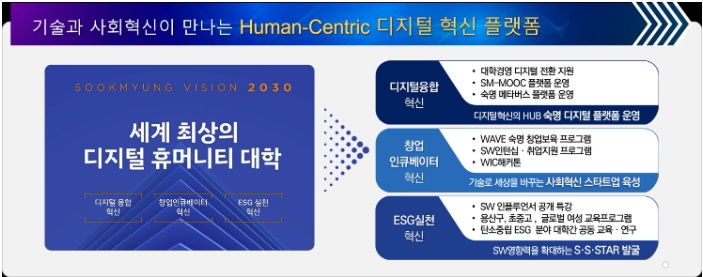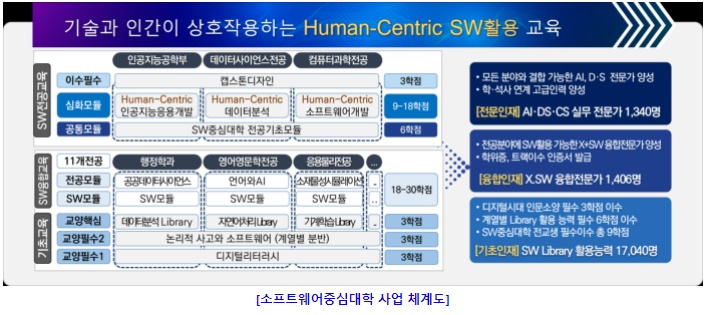Sookmyung Women’s University selected for MSIT’s Software-centric University Project
- Views 8077
- Writer 커뮤니케이션팀
- 보도일자 2022-05-04
Sookmyung Women’s University was selected for the software-centric university (hereinafter, “SW-centric university”) project implemented by the Ministry of Science and ICT and Institute of Information & Communications Technology Planning & Evaluation (IITP) to foster professional IT talents required by the industry.
The SW-centric university project started in 2015 to innovate university education system centered on SW by reflecting the needs of industrial sites and to nurture SW specialists and convergence talents that meet the demand for new technologies such as AI. A total of two universities were selected in the Seoul metropolitan area for this year's SW-centric university project, and Sookmyung Women’s University is the only women's university selected in the country. With this project selection, Sookmyung Women’s University is to receive a total of 15 billion won in government support for 8 years.

With the award of this project, Sookmyung Women’s University plans to expand and strengthen SW-related curriculum in all majors step by step with the goal of becoming a university with “human-centric digital innovation platform where technology meets social innovation.”
First, the school plans to expand and reorganize the existing SW-related majors into three fields: Department of Artificial Intelligence Engineering, Department of Data Science, and Department of Computer Science. Then, by operating major tracks specialized in the field, it is to train experts who can be put into practice right away.
Also, for 11 non-SW departments, such as the Department of English Language and Literature in the Humanities and the Department of Industrial Design in the Arts and Physical Education, the SW Convergence Track, which combines the major module and SW major module, is to be operated. The goal is to nurture convergence-type talents who can utilize SW in their major fields.
At the same time, the school plans to make it mandatory for all students at Sookmyung Women’s University to complete SW-related literacy education, such as digital literacy, so that students in the humanities and social sciences and arts and sports fields will grow into talents with the basic SW skills required by society.

Meanwhile, in addition to the reorganization of the SW innovation curriculum, the school is to implement the student-directed credit system that provides students with opportunities to participate in the reorganization of their major curriculum, the software student activity support program that supports a wide range of student activities such as software clubs, special lectures, and non-curricular activities within the university, and support for S·S·Star (Sookmyung Software Star) activities that foster members who take the lead in spreading the software culture.
The school is also preparing to support not only undergraduate programs but also graduate programs. To nurture advanced SW convergence manpower with expert knowledge in various major fields, high-quality convergence results can be expected by newly establishing programs to support students majoring in other majors to advance into software master’s program and to support software majors to advance into non-software master’s programs.
With the aim to develop into a “global digital humanity university,” Sookmyung Women’s University is also active in discovering socially innovative software start-ups and attracting investment, presenting a performance goal that combines digital convergence innovation, startup incubator innovation, and ESG practice innovation promoted by the university.
President Yunkeum Chang said, “Through the selection for the SW-centric university project, we have secured a driving force to promote future-oriented curriculum reform and reinforcement of student SW competency,” and “we will do our best to focus on the growth and happiness of our students.”



